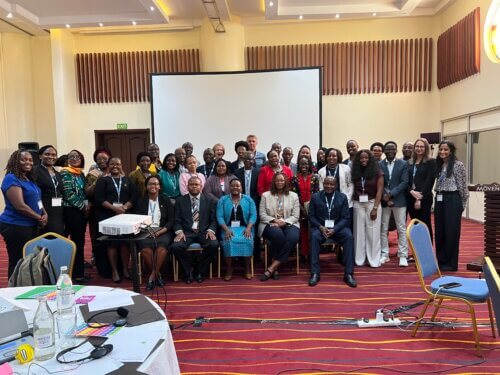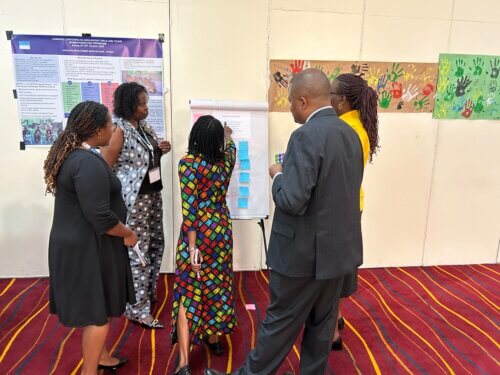Promoting nurturing care: How governments are uniting to strengthen ECD in PHC systems
When health officials, civil society representatives and development partners convened in early October for a side event at the Conrad N. Hilton Foundation’s East & Southern Africa Early Childhood Development Partners’ Convening in Nairobi, there was a singular shared goal on everyone’s mind: Ensuring that responsive caregiving, early learning, safety and security, and development monitoring and counseling are prioritized and promoted at scale in primary health care (PHC) systems, alongside health and nutrition interventions.
Many countries have made significant progress in strengthening their PHC systems. Promoting nurturing care helps them catalyze their progress to improve child development across domains — physical, cognitive, language and socio-emotional — to improve health and well-being across the life course.
The side event brought together a diverse group of more than 45 stakeholders representing government and partner organizations working at the global, regional and country levels. Government representatives included officials from the Ministries of Health in Kenya, Mozambique and Tanzania; Nairobi City County; the National Council for Children Services (Kenya); the President’s Office – Regional Administration and Local Government (PO-RALG) in Tanzania; and the Presidential Delivery Bureau in Zanzibar.

During the day, participants learned about taking a systems approach to promoting nurturing care for Early Childhood Development (ECD) in PHC and new tools in this area. Health leaders from Kenya, Mozambique and Tanzania were featured in a panel discussion and joined other partners during a world café to share progress, as well as key challenges and lessons learned, from efforts to promote nurturing care for ECD in PHC. Then, during small group sessions, participants delved into key actions needed across the health system and the support required to achieve them.
Four key needs emerged from the day’s conversations:
- There needs to be a common understanding of what nurturing care for ECD means and what it looks like within and across countries. Partner organizations and governments within the same country may not always be talking about the same interventions and need to be able to get on the same page to move forward. The Nurturing Care Framework and related tools and resources offer more detail and guidance on what these interventions are and how they can be utilized in communities and facilities, offering a good starting point for raising awareness and creating a common language.
- Now, more than ever, the focus should be on working within government systems. Participants shared the challenges of triaging health services for families as a result of the abrupt cancellation of externally funded development programs. Programs that work outside government systems face increasing threats to sustainability with reductions in international donor financing. Working alongside government partners to mobilize resources and strengthen health systems to deliver what children need is important for sustainability and efficiency.
- Health leaders want more robust data collection that can inform their strategy and priorities. They need more information on what nurturing care for ECD looks like in PHC, where the gaps are and what more can be done. This may take many forms, such as a stocktaking of the PHC system and how it is situated to promote nurturing care across components like early learning, responsive caregiving, and safety and security. It may also take shape in integrating new indicators in health information systems to reflect child development across domains and delivery of interventions that have not been consistently prioritized, such as information, support and counseling on responsive caregiving for parents.
- The health sector needs to strengthen links to other relevant sectors working to support young children and families. Children ages 0-3 and their families often have most contact with the health sector; however, there are multiple service delivery points across other sectors such as education and social protection which reach these same families especially as they grow older. Coordinated policies and services can reduce duplication and amplify efforts for promoting nurturing care for ECD.

R4D, together with Amref Health Africa, the Benjamin Mkapa Foundation, and KixiQuila Consultores has been supporting the Ministry of Health in Kenya, along with the Departments of Health in Nyamira and Nairobi Counties, the Ministry of Health and PO-RALG in Tanzania and the Ministry of Health in Mozambique, to develop guidelines and costed action plans for promoting nurturing care in PHC.
This is a webinar series for partners to learn from each other’s experiences with sustainable financing, multi-sectoral coordination, health information systems and other areas of interest related to promoting nurturing care for ECD in PHC. Simultaneously, R4D has developed a Toolkit for strengthening PHC for ECD. Lessons from this side event will inform next steps in these country-led processes, cross-country learning events, and the development of the global resource.













